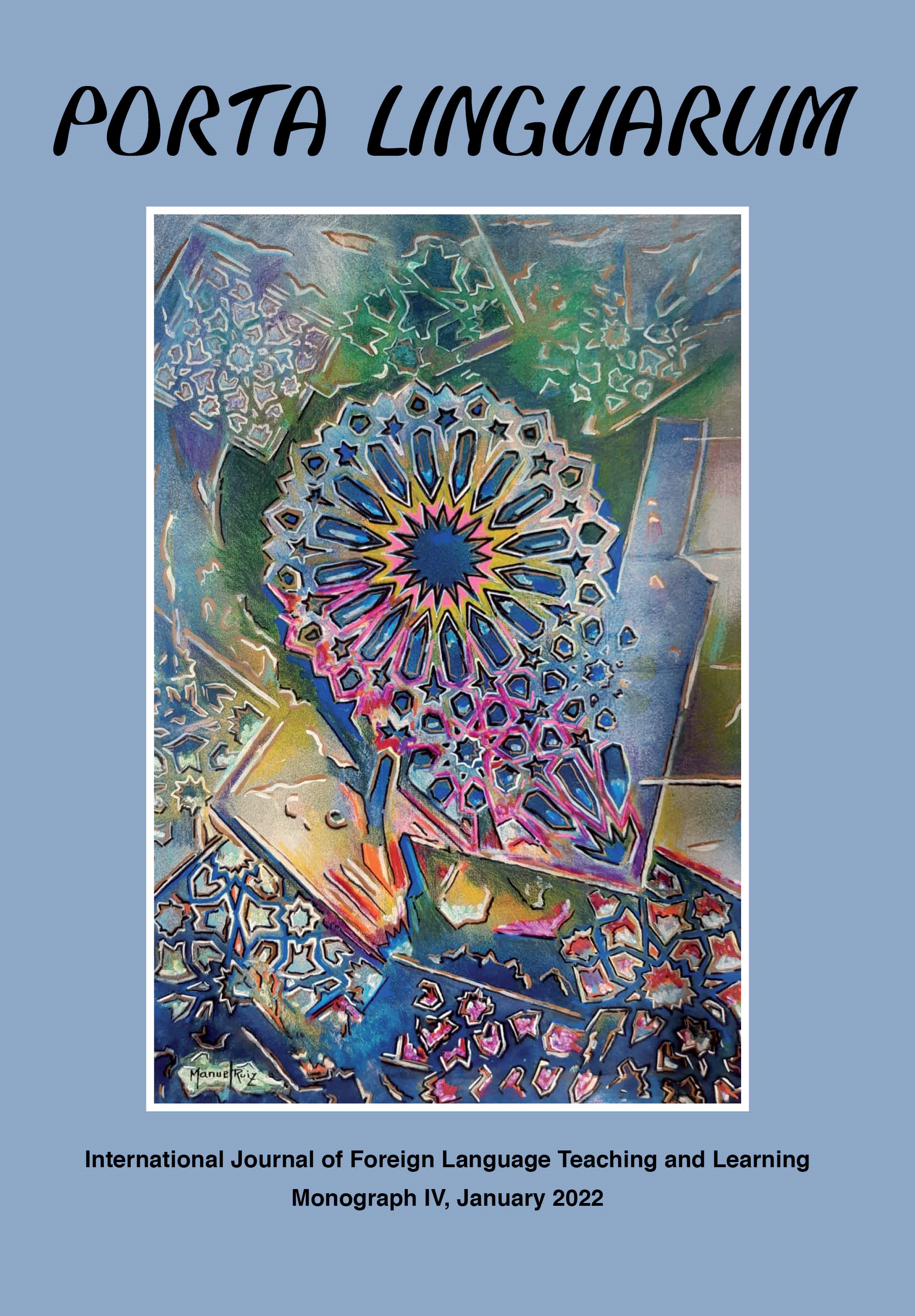Perceived changes of identity construction through digital storytelling:
A collective study abroad case study
DOI:
https://doi.org/10.30827/portalin.vi.23607Keywords:
Study Abroad, Digital Stories, Identity, Activity Theory, Foreign LanguageAbstract
Study abroad (SA) is considered one of the best ways to learn a foreign (FL) or second language (L2) while developing open-mindedness and intercultural awareness. Yet, less attention has been placed on students’ perception on identity development. Thus, this study explores study abroad (SA) students’ perceptions on identity construction through the incorporation of multiliteracies and multimodal texts (digital stories), by six participants in a second-year foundational Spanish course and an Advanced Spanish Grammar course in a Study Abroad (SA) program. Analyses of surveys, DSs, and final artifacts were grounded in Rogers’ notion of self-concept and Activity Theory (Leontiev, 1978). Results suggest that the digital and multimodal nature of DS creation facilitated greater opportunities for students to document their self-perceived gains in identity.
Downloads
References
Anya, U. (2016). Racialized identities in second language learning: Speaking blackness in Brazil. Routledge.
Block, D. (2003). The social turn in second language acquisition. Georgetown University Press.
Burke, P. J., & Tully, J. (1977). The Measurement of role/identity. Social Forces, 55, 881–997.
Elola, I., Nakatsukasa, K., & Tecedor, M. (2018). Developing academic literacy and researchers' identities: The case of multilingual graduate students. L2 Journal, 10(2), 158–182.
Elola, I., & Oskoz, A. (2017). Writing with 21st century social tools in the L2 classroom: New literacies, genres, and writing practices. Journal of Second Language Writing, 36, 52–63.
Engeström, Y. (1999). Activity theory and individual and social transformation. Perspectives on activity theory, 19(38), 19–35.
Ewen, B. R., & Ewen, R. B. (2009). Carl R. Rogers self-actualization theory (I). In B. R. Ewen & R. B. Ewen (Eds.), An Introduction to theories of personality (pp. 183–201) (7th ed.). Taylor & Francis.
Gaspar, B. (2018). The effect of multimodal communication on the development of new types of learner imagination. Retrieved from https://l2dl.arizona.edu/2018-virtual-presentations/the-effects-of-multimodal-communication-on-the-development-of-new-types-of-learner-imagination/
García-Nieto, N. C. (2018). Qualitative Approaches for Study Abroad Research. The Routledge Handbook of Study Abroad Research and Practice. In C. Sanz, & A. Morales-Front (Ed.), The Routledge Handbook of Study Abroad Research and Practice (pp. 58–67). Routledge.
Godwin-Jones, R. (2018). Second language writing online: An update. Language Learning & Technology, 22(1), 1–15.
Gregori-Signes, C. (2008). Integrating the old and the new: Digital storytelling in the EFL language classroom. GRETA, 16(1/2), 43–49.
Hull, G. A., & Katz, M. L. (2006). Crafting an agentive self: Case studies of digital storytelling. Research in the Teaching of English, 41(1), 43–81.
Izmaylova, A. (2017). Using social media to develop intercultural competence through telecollaboration (doctoral dissertation). University of Iowa. ProQuest Dissertations and Theses.
Kinginger, C. (2013). Social and Cultural Aspects of Language Learning in Study Abroad. John Benjamins.
Kinginger, C. (2016). Echoes of post feminism in American students’ narratives of study abroad in France. L2 Journal, 8(2), 76–9.
Kinginger, C., Wu, Q., Lee, S. H., & Tan, D. (2016). The short-term homestay as a context for language learning. Study Abroad Research in Second Language Acquisition and International Education, 1(1), 34–60.
Kubota, R. (2016). The Social Imaginary of Study Abroad: Complexities and Contradictions. Language Learning Journal, 44(3), 347–357.
Lantolf, J. P. (2000). Sociocultural theory and second language learning. Oxford University Press.
Lantolf, J. P., & Thorne, S. L. (2006). Sociocultural theory and the genesis of L2 development. Oxford University Press.
Lee, L. (2011). Blogging: Promoting Learner Autonomy and Intercultural Competence through Study Abroad. Language Learning & Technology, 15(3), 87–109.
Leontiev, A. (1978). Activity, consciousness and personality. Prentice Hall.
Norton, B. (2000). Identity and language learning: Gender, ethnicity and educational change. Longman.
Norton, B. (2013). Norton, B. (2013). Identity and language learning: Extending the conversation. Multilingual matters.
Norton, B., & Toohey, K. (2011). Identity, language learning, and social change. Language teaching, 44(4), 412–446.
Onwuegbuzie, A. J., & Teddlie, C. (2003). A framework for analyzing data in mixed methods
research. In A. Tashakkori & C. Teddlie (Eds.), Handbook of mixed methods in social
and behavioral research (pp. 351–383). Sage.
Oskoz, A., & Elola, I. (2014). Integrating digital stories in the writing class: Towards a 21st century literacy. In J. P. Guikema & L. Williams (Ed.), Digital literacies in foreign and second language education (pp.179–200). CALICO.
Oskoz, A., & Elola, I. (2016). Digital stories: Bringing multimodal texts to the Spanish writing classroom. ReCALL, 28(3), 326–342.
Rogers, C. R. (1959). A theory of therapy, personality, and interpersonal relationships as developed in the client-centered framework. In S. Koch (Ed.), Psychology: A study of a science: Vol. 3. Formulations of the person and the social context (pp. 184–256). McGraw-Hill.
Thoits, Peggy A. (1986). Multiple identities: Examining gender and marital status differences in distress. American Sociological Review, 51, 259–272.
Tullock, B. (2018). Identity and Study Abroad. In C. Sanz, & A. Morales-Front (Ed.). The Routledge Handbook of Study Abroad Research and Practice (pp. 262–274). Routledge.
Vinogradova, P., Linville, H. A., & Bickel, B. (2011). “Listen to my story and you will know me”: Digital stories as student‐centered collaborative projects. TESOL Journal, 2(2), 173–202.
Vinogradova, P. (2014). Digital stories in heritage language education: Empowering heritage language learners through a pedagogy of multiliteracies. In T. G. Willey, J. K. Peyton, D. Christian, S. C. K. Moore, & N. Liu (Eds.), Handbook of heritage, community, and native American languages in the United States research, policy, and educational practice (pp. 314–323). Routledge.
Williams, T. R. (2009). The Reflective Model of Intercultural Competency: A Multidimensional, Qualitative Approach to Study Abroad Assessment. Frontiers: The Interdisciplinary Journal of Study Abroad, 18, 289–306.



















